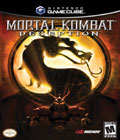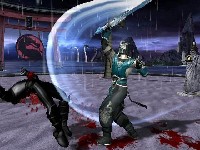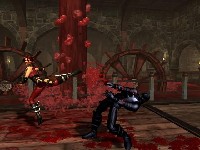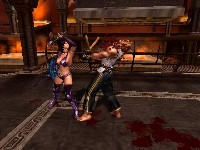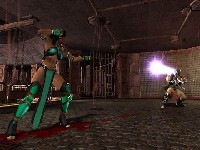Genre: Fighting
Developer: Midway
Publisher: Midway
Release Date: October 4, 2004
Buy 'MORTAL KOMBAT: Deception': Xbox | PlayStation 2
The Mortal Kombat series has been like a long surf on the ascending and descending waves of quality. The first game was a success, but the gameplay was in dire need of some sprucing up; it simply did not control as smoothly as the Street Fighter games did. Then Mortal Kombat II hit the arcades. The fighting and graphics engines were drastically improved upon, with greater balance, better variety of playstyles between characters, and much better backgrounds – and, in trademark Mortal Kombat style, lots and lots more blood. So much, in fact, that the game was the subject of many a public radio piece because of the massive outcry against its "corruption of the youth."
But by the time Mortal Kombat III was released, the fervor for and against the series was already dying down. MK3 did not add much in the gameplay or graphics departments, with its only saving grace being the amount of selectable characters, many of which had designs which were rejected by fans as either too boring or too over the top (quite a feat for an MK game!). The series reached a level of mediocrity previously untouched.
When Ultimate Mortal Kombat III was released, players found a much more complete and most importantly, respectable version of MK3, although some would say that it was too late in coming, and the anticipation for the original version of MK3 had already died down, leaving the above-average Ultimate for the hardcore fans of the series. Then Mortal Kombat 4 came out, bringing the series into a few new playing fields: the third dimension, weapon-based combat, and near-complete apathy from the public. The game was just not fun to play. It seemed to have less of what the previous games had to offer, coupled with bad character designs and worse control.
It wouldn't be until years later that the release of Mortal Kombat: Deadly Alliance would restore the series to a level of credibility because of a design ethic never seen before in the series: a strong focus on the actual fighting by the designers. Deadly Alliance does have flair, but not in the same psychotic vein as Ultimate with its crazed babalities and other visual madness. Instead it gave each character multiple fighting styles, put a newfound focus on complex combos and combo breaking, and actually made weapon-based combat work in an MK game.
Deadly Alliance is not the ultimate MK game for fans of the series – I'm sure the second game will always be, if only for nostalgia – but for casual fighting game fans, it was an accessible fighter with just enough depth to keep people playing, but not so much that it would scare some players off (Virtua Fighter 4: Evolution). Mortal Kombat had credibility once again, and not only with pre-pubescent death-mongers who loved nothing more than over-the-top onscreen death.
The reason I have taken this dip into Mortal Kombat history is because it holds a great amount of weight with regards to my reasoning as to how I will review Deception. I am not a Mortal Kombat fan, you see. I always found the series to be nothing but a pointless gore-fest to keep the kids glued to the joysticks – and not even a pretty one, at that. So the release of Deception makes me even more surprised: A Mortal Kombat game that I like to play? A Mortal Kombat game that I like to play almost daily? Since when? But it is. For your fifty dollars, Deception has a lot to give. Let's take a look at why this is one of the better releases this year.
First, let's look at the meat of the game: The straight fighting engine. There is a fantastic selection of characters to choose from, each with a set of three unique fighting styles ranging from shaolin to drunken fist. Each character also has a weapon with which to deal out death, each being useful in its own way. Gone are the days of having sixteen ninjas dressed exactly the same except for the colors of their garb, each playing slightly similarly – every one of these characters not only looks differently, but plays differently. Even classic characters like Scorpion and Sub-Zero have drastic changes to their move lists, and all of it is for the better.
It must be said that the game plays a bit too much like Deadly Alliance did, not adding much besides a new storyline, slightly spruced up graphics, and new moves. But the subtle changes in the fighting engine have important effects on the gameplay, to the point that Deception plays much, much more smoothly than Deadly Alliance ever did. The most important change is in the execution of combos. Deadly Alliance was often railed by critics and fighting game fans alike for its "dial-a-combo" fighting system, which allowed players to simply "dial in" the correct button combination for a massive combo, and their characters would charge forth with the defined attacks, not stopping for anything but a breaker.
Depending on when the combo was set and the skill of the player on the defensive, this caused one of two situations to become dominant in the fighting: Either the combo would start and the attacker would see a breaker/combo rebuttal coming and not be able to stop and deal with it, or the defensive player would become overcome by a massive, unstoppable attack and the fights would be dominated by the same huge combo being used repeatedly. This is no longer a problem in Deception, since combos can be stopped at any time by simply not pressing a button, or by changing the button press after a combo begins in order to abort. This slight change has added so much depth to the use of combos that more of the chaotic back-and-forth assaults that make up top-tier fighting games are now in Deception, since nobody is afraid to make use of a massive combo, but if they do they had better know what they are getting into!
While the conflict itself is improved, a few flaws that could have been easily dealt with in testing are still present. Environmental fatalities are a big problem with the level design, as one will find within hours of play. It is simply too easy to end a fight by knocking an opponent into a meat grinder or something similar, causing many battles to feel cheapened. Too many times I ended up accidentally knocking or being knocked into some sort of instant-kill hazard. These cheap endings will surely keep Deception out of any fighting game tournament scene that could develop around it, which is a shame since the original titles were so entrenched in that sort of community.
So yes, Deception is a fun, though still slightly flawed game, with less of the problems from its predecessor but not enough change to warrant any massive resurgence of the series on its own. So why is this such a value-filled package? Simply put, it's because of how much is on the disc. And it's all of very good quality, considering much of it is extra fluff not meant to be the focus of the game.
The most grand vision presented by Deception is the surprisingly huge Shenmue-esque adventure game called Konquest mode. Players take on the role of Shujinko, a hero chosen by the elder gods to go on a massive quest – we're talking twenty hours or so, here – to restore order to the universe. If this were a stand-alone game, I would be ripping it to shreds: The movement is laughable (Shujinko charges about like a speed-addled freak), the environments are ugly, and the voice acting is so bad that you might end up killing yourself if you take it seriously.
But as an extra, Konquest is impressive. The environments are massive; they would take many hours of work just to design on paper! And, as previously mentioned, the game is very long. And it's fun, too. Since your character can transform into any of the fighters he has been trained by in the course of the game, you are forced to develop a at least a minimal understanding of every "kombatant". Sure, you can do the same in the training mode, but somehow it feels more tangible here, since you are taught the moves, forced to learn each one properly, and then made to use them with a goal in mind. It's much more intense than setting an NPC to jump mode and beating the thing up for awhile. Most players probably won't finish this mode, but I found myself heartily addicted to it despite its obvious flaws.
Chess Kombat is an Archon-like chess-meets-killing game, which mostly follows the rules of chess, except players will not necessarily take an enemy piece by simply moving to a square with an opponent's piece on it; as expected, this is solved by "kombat". Different types of pieces have different amounts of health, along with other assorted strengths and weaknesses. Adding to the depth is the availability of traps, and squares that allow players to power-up their "kombatants". This is probably the weakest of the extras, but it's still fun, and as with everything, you can see that a lot of effort was put into it.
The most popular extra in my experience with the game was the direct rip-off of Capcom's Puzzle Fighter: Puzzle Kombat. The mode is a fun Puyo Pop-like game with a twist: Instead of matching colors and creating immediate explosions, pieces are removed by touching a number of pieces of the same color with a breaker-piece of the same color, while two super-deformed characters duke it out in accordance to the puzzle action.
Adding to the fun is the Super system. Each character has a bar that rises depending on the actions of the player (i.e., a combo will raise the bar a good amount, while a normal break with only a few pieces will raise it a smaller amount). Once it fills, the square button can be pressed to unleash a Super move. Each "kombatant" has a different super move, some being extremely useful (Ermac's levitation) and some being nearly useless (Baraka's edger). These move imbalances are so glaring that I simply don't understand why the testers didn't wave a panicked red flag upon finding them. This is an extra, I know, but this should have been dealt with. Either way, I've admittedly played this mode slightly more than any other, including arcade kombat, so the problems may be annoying, but the mode is still one of the best.
Graphics and sound are where Deception shows its worst skin. The engine was not built from the ground up for this game, as Midway instead opted to use the RenderWare tools to create the game. Thus, the look of the game is not from an engine optimized for this sort of gameplay, and while more effort could have eliminated this, it seems fairly obvious that Deception isn't built from the ground up. All of the textures are muddy and the effects are dull, even for an MK game. Konquest mode is the worst offender, with blocky characters and glitchy, blocky textures all over the place. The music is very understated, but what is there seems to be out of place, once again, even for an MK game. The framerate remains mostly stable, however, so none of this really affects the gameplay.
I still can't believe I am writing this review in the way that I am. Never, in my wildest dreams, would I have thought, say, four years ago, that I would fall in love with a Mortal Kombat game. Deception has done it. Somewhere between the incredible combo system and the freakish amount of extras, this game captured my heart like no other in its series. Sure, I'd still rather throw in Soul Calibur or Street Fighter Alpha 2 for my one-on-one fighting needs, but when I've got some friends together for the evening who aren't fighting game fanatics, I'm going to boot up Deception, and no matter who is playing, we will be able to have fun with the game in one way or another. I can't wait to see what Midway is going to do with the next game in this series.
Score: 8.5/10
More articles about Mortal Kombat: Deception











